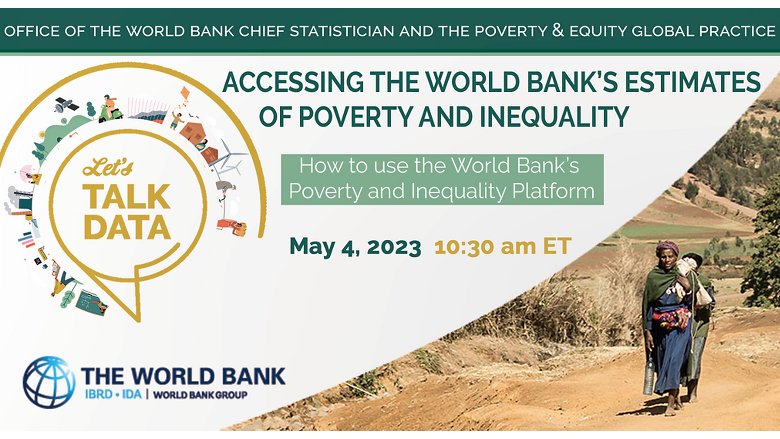Organized by the World Bank¡¯s Development Data Group and Poverty and Equity Global Practice
Event description:
Learn how to use the, the interactive computational tool that offers users quick access to the World Bank¡¯s estimates of poverty, inequality, and shared prosperity.
PIP provides a comprehensive view of global, regional, and country-level trends for more than 160 economies around the world. Users can access the poverty and inequality estimates directly through the R () and Stata () packages. Advanced users can also work with the anonymized underlying microdata and perform their own analysis.
In this seminar, you will learn more about how to use the PIP website, how to access the estimates through the R and Stata packages, and how to access the underlying microdata.
Opening remarks by:
Luis Felipe L¨®pez-Calva
Global Director for the World Bank Group¡¯s Poverty and Equity Global Practice (GP) in the Equitable Growth, Finance, and Institutions (EFI) Vice Presidency. He has over 30 years of professional experience working with international institutions and advising national governments. Luis Felipe rejoined the World Bank in 2022 from the United Nations Development Programme, where he served as UN Assistant Secretary General and Regional Director for Latin America and the Caribbean since 2018. His research interests focus on labor markets, poverty and inequality, institutions, and the microeconomics of development. He is a prolific author on these issues in peer-reviewed academic journals.
Speakers:
Martha Viveros
Consultant at the World Bank, specializing in data and statistical analysis for poverty and inequality measurement. Her experience as a Research Assistant at the Bank includes the Poverty team for Latin America where she worked extensively with the country teams for Brazil, Paraguay and Argentina, as well as the Statistical Team where she contributed to the LAC Equity Lab portal. Currently, she is part of the Global Poverty and Inequality Data Team (GPID), the team co-responsible for the World Bank¡¯s global poverty numbers in the Poverty and Inequality Platform (formerly PovcalNet). Martha holds a master¡¯s degree in International Development from the American University.
R. Andres Castaneda Aguilar
Economist/Data Scientist in the Data Group of the Department of Development Economics at the World Bank. During the last ten years, he has been working on socioeconomic analysis in topics related to poverty, welfare distribution, inequality of opportunities, development economics, and conflict economics. He is interested in the analysis of data for policy dialog; statistical and methodological research; and the development of computational tools in Stata and R to make socioeconomic analysis intuitive, easier, and faster. Andres has contributed to building analytical portals like the LAC Equity Lab or interactive guidelines like the . Currently, he is part of the Global Poverty and Inequality Data Team (GPID) team.
Minh Cong Nguyen
Senior Data Scientist with the Poverty and Equity Global Practice of the World Bank. His research interests include poverty, inequality, imputation methods, small area estimation, and data systems. He currently leads the Middle East and North Africa Data Lab, and previously co-led the Europe and Central Asia Team for Statistical Development, and the Data for Goals team in the Poverty GP. He has worked as a consultant with the Africa Region, South Asia Region, the Human Development Network, and the Private Sector Development Network at the World Bank. Minh has a Ph.D. in Economics (applied micro-econometrics) from American University.
Chair:
Christoph Lakner
Program Manager for Global Poverty and Inequality Data in the Development Data Group (Indicators and Data Services team) at the World Bank. His research interests include inequality, poverty, and labor markets in developing countries. In particular, he has been working on global inequality, the relationship between inequality of opportunity and growth, implications of regional price differences for inequality, and the income composition of top incomes. Christoph is also involved in the World Bank¡¯s global poverty monitoring: he leads the Poverty and Inequality Data team in the Development Data Group, which co-produces the Poverty and Inequality Platform (PIP).
